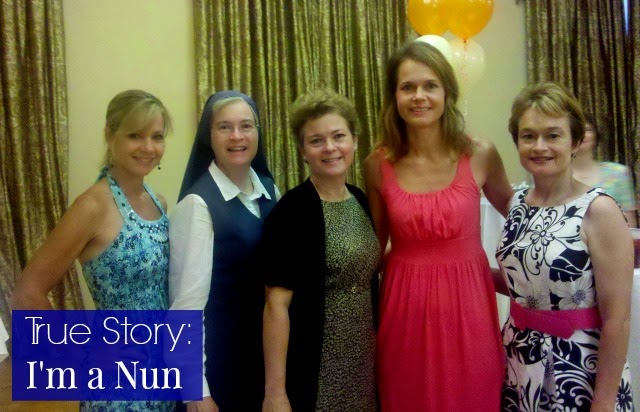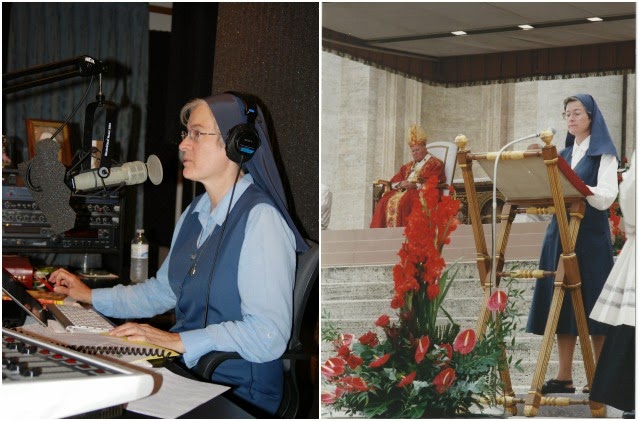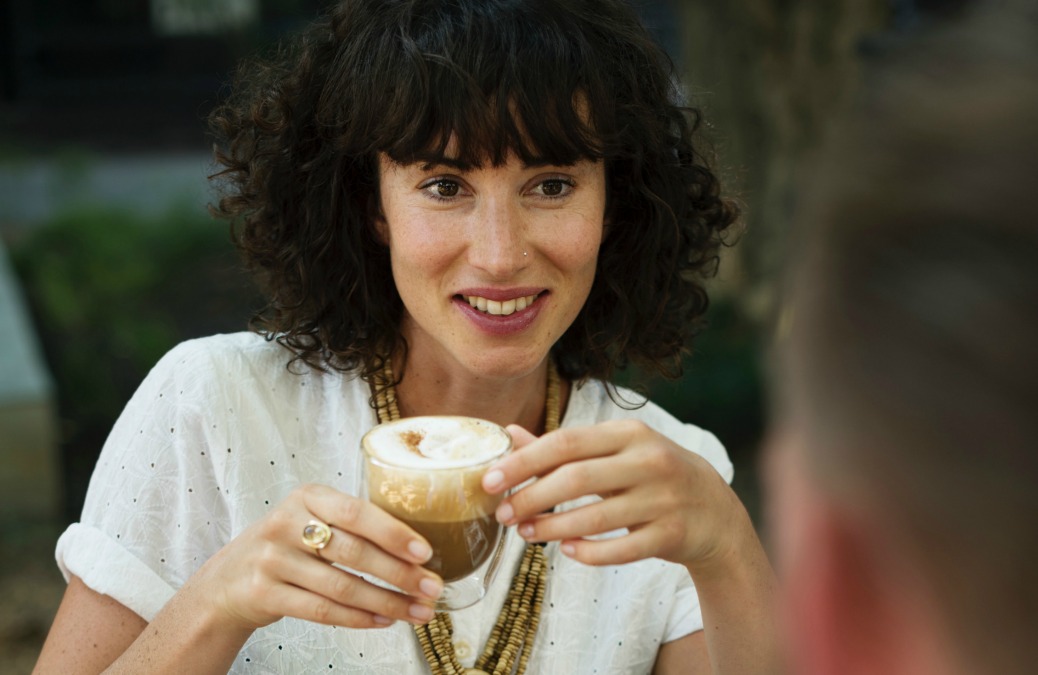Tell us a bit about yourself!
My name is Sister Anne. Being from New Orleans is a huge aspect of my life, and it shows, I think, in two of my big interests: food and music. I enjoy cooking and experimenting in the kitchen, trying new things out on the sisters (who don’t seem to mind).
In terms of music, my tastes are all over the place. I discovered classical music (Bach’s Brandenburg Concerto #3) when I was 13, but I also really like zydeco (the fiddling reminds me of Bach), country music, R&B. I also really love to sing, and have been a part of my community’s recording choir since 1987. (We have released over two dozen albums.) I even got to sing for Pope St. John Paul’s Mass in June, 2000!
Another big area of interest for me is reading, writing, social networking, technology. I was part of the Vatican’s Jubilee Internet Office for the Year 2000 (which is why I was in Rome for the Pope’s Mass). I got on Twitter when it was still in beta, just to see how it worked. (Now I have over 13,000 followers, and a sister I had to convince to start a Twitter account is now the most followed nun in the world,
@SrHelenaBurns.)
What are some of the most common misconceptions about nuns?
Probably the big one is that we are either childlike naifs or social misfits who can’t find a place in the world. (Eyeroll.)
Did you grow up in the Catholic church?
I was baptized into the Catholic Church when I was 17 days old. Marked for life. Not only did my family background support my Catholic upbringing (Dad was national President of a Catholic men’s organization), the culture of New Orleans itself is permeated with Catholicism.
When did you receive your calling to join the church?
During my last year in high school (1974), I was looking for a way to combine my interest in communications and writing with serving the Church. In some way, I wanted to help the Church communicate better. Meeting the Daughters of St. Paul in their New Orleans bookstore revealed a perfect fit: Jesus and media in one life! 40 years later, it is still a perfect fit.
How did the people in your life react to your decision?
Dad was concerned because it meant giving up an important scholarship.
Years later, I also learned that my leaving home at 18 was really hard on my six younger siblings. They felt I had abandoned them. You can’t imagine how hard it was on me, though: the youngest was only six! Jesus wasn’t kidding around when he challenged people to “leave everything and follow me.”
Could you tell us about the training you went through before becoming a nun?
After a period of discernment with the sisters by means of letters, retreats and in-person visits, I entered what is called “postulancy.” I left home to share in the prayer life of the community; got introduced to its history, ministry and spirituality, and began putting my gifts at someone else’s disposition, rather than by my own lights. This is when I started writing, too.
After that year, I was admitted to novitiate. At this point, I was officially a “member” even if only with “trainee” status. Novices are called “Sister”; they continue the experience of living in community, putting the vows into practice in a concrete way. (For instance, everybody seems to think that the vow of chastity is only about sex—or lack of it—but it is really about the appropriate ways to make a loving gift of self: a gentle word with a lonely person is absolutely an expression of the vow of chastity, unless you are seeking yourself in the deed!)
During those two years, there was more time to read, pray and study the Bible; I was also assigned for a few months to New York to get a feel for the way of life I would be committing to if I went ahead with vows.
Three years after entering, I made my first vows as a Daughter of St. Paul, committing myself “for one year to live chaste, poor and obedient” and to devote my energy to the service of “evangelization with the media of communication.” Every year, I asked to renew my vows, until finally I was allowed to prepare for “perpetual profession” (final vows). After a kind of novitiate-like experience for five months, instead of making the vows “for one year,” I made them “for all my life.”
Making those perpetual vows really stabilized my sense of belonging to the community. In fact, there’s a beautiful formula that the Superior who witnesses the vows says in response to the sister: “From now on, everything will be in common among us.”
When there have been things I’ve had to let go of, dreams that I had to let vanish, this has really helped me, knowing that someone else, maybe a fellow-sister, maybe a person I’ll never meet here below, can benefit from it. Sacrifices can be a way of fostering another person’s flourishing.
I think a lot of people imagine nuns living in a convent, praying and singing all day. What’s an average day like for you?
The image many people have is from the monastic life where prayer determines everything else. For communities with an active ministry, the work makes some practical demands that the community structures have to accommodate.
During my 13 years in Chicago, it was the bookstore’s schedule that determined when, where and how we would pray together or have a meal together. (Morning Prayer together right before opening; Evening Prayer a half-hour after closing; l-o-n-g, chatty supper after that—including doing the dishes together!) For the rest, each sister arranges her own schedule, according to the tasks at hand.
How is your cost of living covered?
We live very simply and we work very, very hard. The Daughters of St Paul are self-supporting (well, we try to be). The order was founded in 1915, and we have publishing houses and bookstores around the world with the usual business-type structures. In the developed world, these are challenged by changes in technology and people’s media preferences.
A few of the sisters have positions in diocesan offices or other Church entities; their salary goes directly to the community (that vow of poverty). I sometimes give conferences on spirituality or lead a retreat; the stipend gets signed over to the community.
We are trying to figure out how to “go out to the peripheries,” as Pope Francis says, reaching people who are looking for the Church and its message, but we still need to support ourselves. If you have any ideas, let me know.
Have you ever questioned your decision to become a nun?
My experience of that perfect match between my desires and my call was and remains so clear that even the most intensely frustrating moments have not led me to question my vocation. That said, there have been times when I felt betrayed, written off or rejected by sisters or superiors. I have learned that I can turn those experiences into a gift of self that can be life-giving, if not immediately for me, then for someone who will come after me. I have decided to let everything “work together for good,” even if it is not my good.
What are the best parts of your life as a nun? The most challenging?
The best parts of being a nun are the same as in any well-lived life: a feeling of connectedness; the ability to use my gifts in doing something I love; contributing to something that will last longer than I do. It boils down to a sense of meaning.
The most challenging times are when any of those values appears to be threatened. Watching a worthwhile project go down the rabbit hole of bureaucracy, for example. That’s where faith has to come in and show me that the meaning is intact, despite the evidence.
What’s one thing you’ve learned that any of us – regardless of our faith – could apply to our daily lives?
Be willing to learn from everything.
Thanks so much for sharing your story, Sister Anne! Do you guys have any (polite, respectful) questions for her? Are any of you devote Catholics?














Great interview! I wasn't raised Catholic but my mom taught at a small Catholic college when I was young. I had to go to work with her if she was teaching while I had a day off from school. I have fond memories of "helping" some of the nuns in their offices while she was in class.
This is great! I am a practicing Catholic and I am often frustrated at the way that Catholicism is portrayed in the media / social media. In general I do not find a conflict between my religious views and my political views (quite liberal) OR, for that matter, with my scientific views (I'm a scientist). I have known many nuns and they all are different in so many ways.
I absolutely loved this interview (and it really spoke to me because I'm currently trying to discern if I should become a nun) and I loved your comment too, anon! I'm really liberal myself in most ways (with lots of very liberal, non-Catholic friends) and science-minded, so it's always wonderful to hear of other faithful Catholics who don't see a conflict between the two. On the contrary, my love of social justice and science/nature was a huge part of why I became Catholic in the first place–in my mind they really complement each other!
Thanks for sharing Sister Anne's story, Sarah! I've always found it fascinating that nuns were responsible for running hospitals, schools, and universities long before it was socially acceptable for women to be in leadership positions. I was raised Roman Catholic and I've heard more than one person describe nuns as the "original feminists." Thanks again for a great read. 🙂
I love it! I'd never thought of it like that but that's a great point!
I am not a practicing Catholic, I grew up in a strong Catholic city (and Catholic private school and high school), and I have nothing but respect for nuns. Maybe 10% of my teachers were nuns, and they were all so sweet and loving toward everyone.
Sarah M
I love this series – so interesting to get completely different perspectives!
Kat x
http://thelondonplaybook.wordpress.com
After all girls Catholic high school I'm not going to lie, part of me thought becoming a nun might be the way to go (that sentence would probably shock a bunch of people). They do so many good things, have friends around, and get to live relatively normal (albeit simple and hardworking – which some of us do anyway) with a devotion to their faith. I also went on a retreat with about 10 girls once and stayed in the convent with the sisters and we found their liquor cabinet. So we know they have a good time sometimes.
haha, that is so funny. You might really enjoy the BBC series, "Call the Midwife". One of my favorites. 🙂
Thank you SO much for posting this! I especially relate to the comment about being frustrated at how Catholicism is often portrayed in society, and I love the comment about how Catholic women (nuns) have run significant health and educational institutions since before it was acceptable for women to be in leadership positions.
I'm an educated woman in my early 30s, I've got a great career, a passion for social justice and some serious hipster leanings – and I also go to church every Sunday, am pro-life, and give something up for Lent every year. These things are not mutually exclusive.
Thanks again, Sarah, for posting a wide variety of experiences and opinions!
Thanks so much for the kind comment, Anon! I try to present a wide variety of interviews that reflect a wide variety of lifestyles and choices, it's always gratifying to hear that it's appreciated. 🙂
My grandfather's three sisters are all nuns, Sisters of St. Joseph, and they were all teachers. What is the difference between the Sisters of St. Paul and the Sisters of St. Joseph?
There are lots and lots of different orders for nuns–which you join all depends on what your interests are and which calls to you. Some are teachers, others work in orphanages or hospitals, some do social justice activism and others evangelize, etc. They're all nuns, they just live their daily lives with different focuses. Hope that helps! 🙂
I have spent so much time thinking about how I affect others with my actions that I have never considered how I would affect them by what I did *not* do. What a humbling and beautiful thought.
This interview hit very close to home for me. My sister-in-law-to-be is in fact, a Sister. She is a teacher, and engaged in her community and her order. She is creative and giving.
One of the hardest parts of her decision to devote herself to religious life, in my opinion, is the affect it has on the family she left (behind). In a way, she made the decision not only for herself, but for everyone that loves her. I know that Sister Anne touched on this, but in my view, it is a lot like being deployed for God. You are told when you can visit home and for how long, you get a stipend, and you are assigned to certain places for certain amounts of time, with little personal input. This is somewhat devastating for parents and siblings. You cannot simply contact your daughter (or sister) to find out how her week is going and visit with her, or bring her a gift. (Although certain orders have different rules.) She won't be around to be an aunt to your children, and when her parents fall ill, she also won't be there to help with tough decisions.
I wholeheartedly support that everyone should follow their life's passion (religious or not). I don't think that my fiance's sister would be as satisfied doing anything else, and it is undoubtedly a constant struggle in terms of the sacrifices she must make. I am inspired by her, but I also see the affect of her choice.
Sr.Ann Flannigan has been my spiritual mentor via social media.I have never met her but she has been so important in my often feeble faith journey.Thanks for this article!
This was such a wonderful and informative interview. I learned a thing or two and appreciate Sister Ann sharing her story!
Love this post! I am a pretty devout Catholic, and one of my close friends is actually entering the convent soon! In less about a week actually. It's so good to hear that even 40 years after her vows, she is still so content and joyful, even with the sacrifices she's made. This post really put a smile on my face 🙂 I'm going to be sharing this post with my friend!
I looked into protestant orders, but unfortunately the last one in the US decided to become Catholic. If not, I seriously would have considered beginning the process of discerning if this was for me.